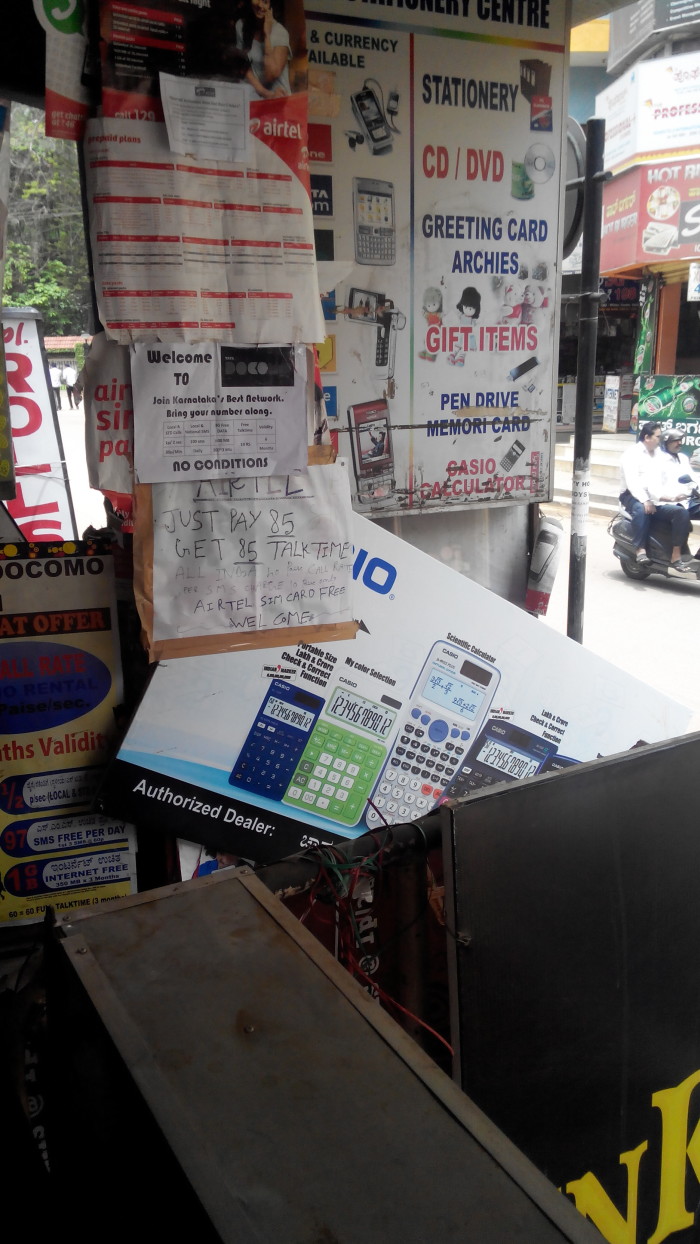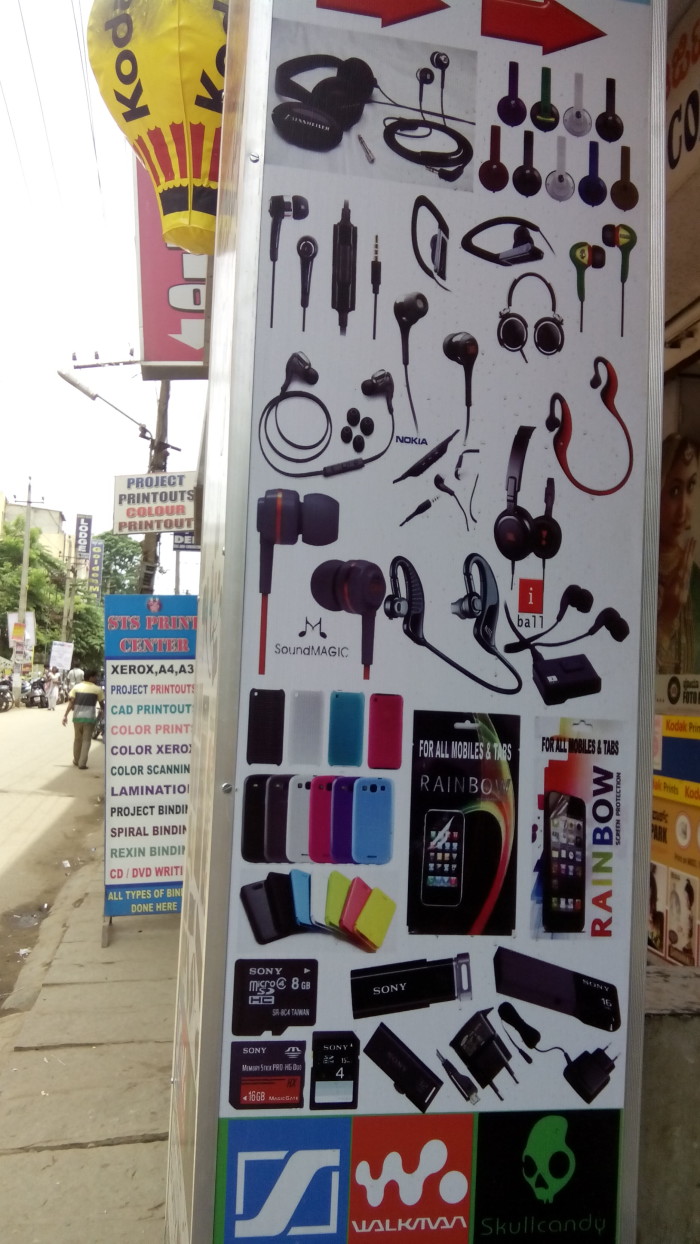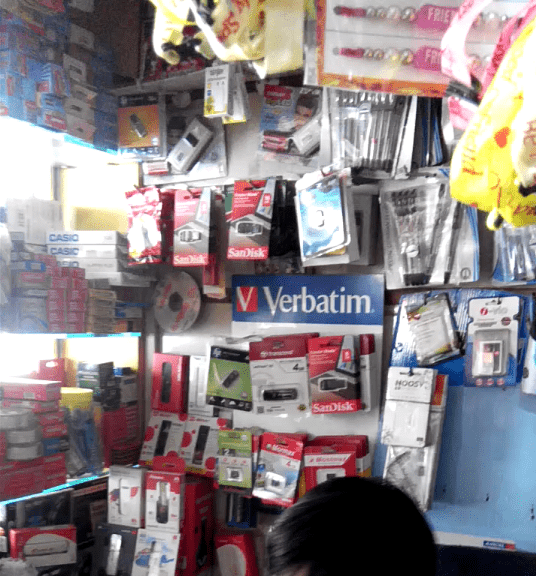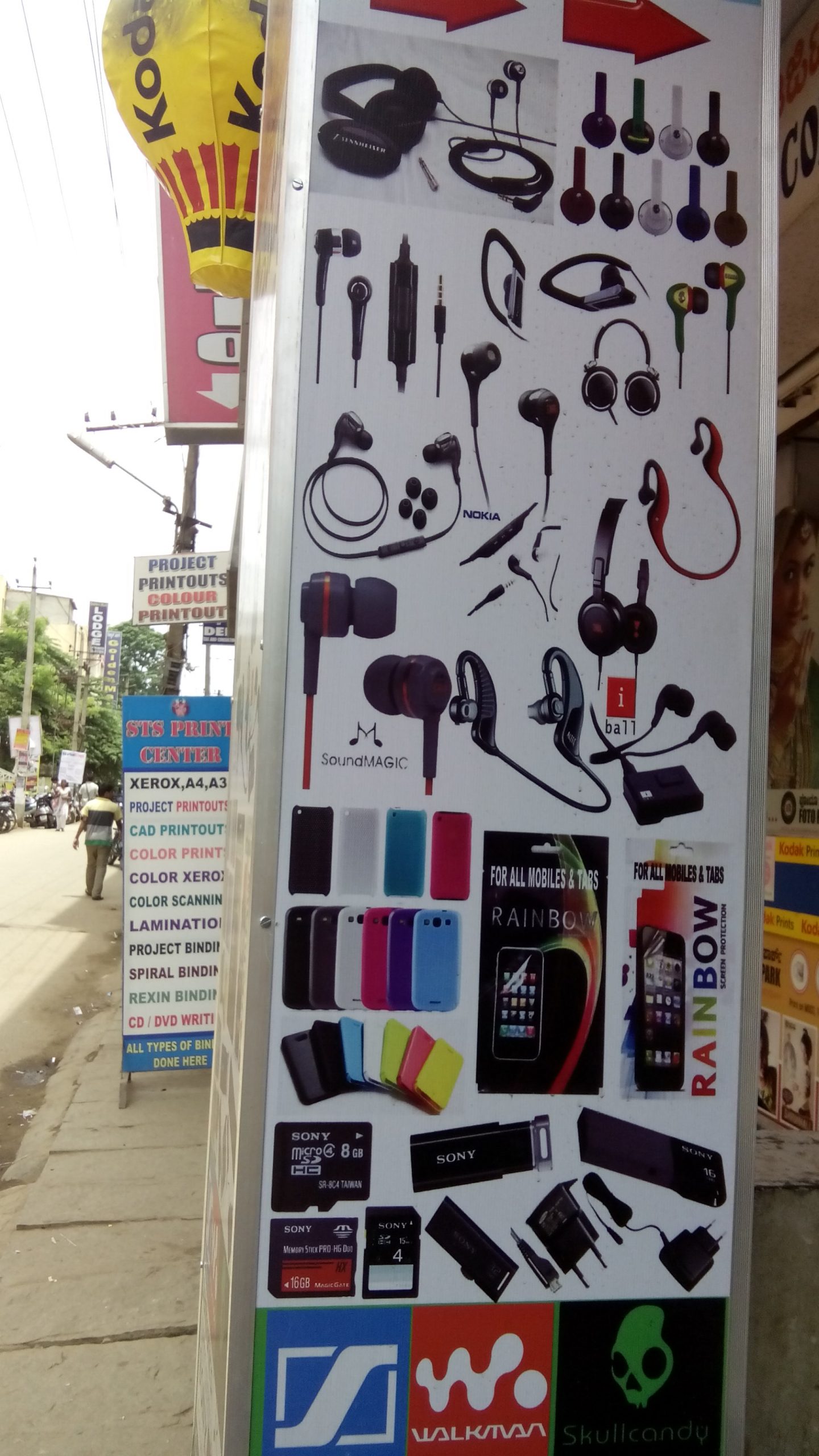This is the second research note from Rashmi M, one of the short-term social media research fellows at The Sarai Programme.
In this blog post, I discuss the spread of content business [1] in relation to media consumption practices via mobile phones prevalent mostly among users with limited technological access and economic means. I will share a few empirical insights from my field-work and try to give a picture of mobile phones, accessories and services shops that are into content business in Bangalore.
My entry into the field started with casual conversations with auto rickshaw drivers, taxi drivers, vegetable vendors, bus drivers and security guards whom I had previously identified as potential subjects. I began fieldwork in selected market areas in some busy streets of Bangalore to observe the mobile phone usage of vegetable vendors, street peddlers etc. I regularly visit these streets and try to converse with people around and build rapport with potential informants. I document my observations and follow the leads that I gather when speaking to these users about the types of phones they use, the peripherals and accessories they buy along with the phone, the costs they pay for accessing the Internet, their modes of consumption of media content etc. In this post I focus on the consumption of media content mainly via mobile phones, and describe the social entities and practices that have emerged around such consumption. [2]
As I went around asking auto rickshaw and taxi drivers, vegetable vendors and security guards where they source the content for their mobile phones from, most of them replied that they buy it from mobile phone shops. Unlike users with regular and uninterrupted access to the Internet via broadband, these users connect to the Internet mainly through their mobile phones by subscribing to 2G and 3G data packs [3] offered by almost all telecom service providers in India. Though a few of these users download videos and MP3 files from the Internet, they also visit these shops to load content on their phones or flash drives (as downloading from the Internet costs them more). Some users do not go online at all but get songs, movies and video clips from these small shops. It is also important to note here that most of these users do not have computers and use their mobile phones (often smart ones) to meet all the needs for which a user from a different social class might use a computer.
Following the leads and directions given by users, I approached a few shop keepers who my user informants told me sold songs and videos. However, when I asked these shop keepers if I could get Kannada film songs of 60s and 70s, they eyed me suspiciously and told me that they do not sell songs or videos in their shops. Puzzled by this denial, I continued to try different shops in different localities. While I knew it was not going to be easy to get these shop owners to speak about their business, I did not expect a total denial. It took me a few days to realize that I was being perceived as a police informant or a journalist who will ‘expose’ the business. One of the shop owners who showed me the catalogue of songs on his computer told me that he would transfer them to my flash drive for ‘free’ but refused to acknowledge that he ‘sells’ such songs. The moment I told them that I am a researcher, they shut themselves up and refused to talk to me lest they say something that might jeopardize their business. While users I have spoken to are not anxious about the legality and illegality of the content they source from these shops, [4] the shop owners are very much aware of the illegality of the content they sell and are extremely cautious about it. As a female researcher perceived to be coming from a certain social class, my entry into these spaces is a complexly layered interaction in which the information I get is always dependent on how I am perceived by the informants I approach. I will elaborate on this in another post.
I tried different strategies that could work in my favour. After a few thwarted attempts to directly speak to the shop owners about the business, I tried to initiate conversations with several shop owners by asking them general questions about mobile phone business, their earlier occupation, the reason to move into mobile phones and accessories business, and so on.

These shop owners spoke about SIM card vending, recharge, mobile phone accessories and the repair business, but did not mention anything about selling content. In fact, their inhibition and suspicion while being asked about content business was very palpable. After I assured them that I am just a student doing research, several shop owners expressed their fears about possible seizures, raids and the police but continued to deny that they trade content. Subsequently, given the difficulty of developing informants through ‘cold calls’, I decided to approach shop owners through users who are regular customers and to accompany them to the shops in order to witness firsthand transactions of media content. I requested a user to take me along with him on his next visit to a mobile phone shop to buy songs and movie clips. I witnessed firsthand the transaction and learnt that trust plays a major role in this business. Through this approach, I was able to gather more in-depth information. For example, I learned that the market price for one GB of content in Bangalore varies from Rs. 30-50, depending on how regular a customer one is. Through these preliminary observations, I surmised that the content business in these shops is invisible but happens all the time, and is indeed probably their main business.
The nature of mobile phone accessories and services shops

These shops can be found on almost every other street and are very common on most busy streets in Bangalore and other towns. In the locality (I am studying) there are twelve such shops within a distance of 500 meters. And in big media markets in Bangalore, they dominate the entire market. They sell all kinds of mobile phone accessories such as mobile cases, flip covers, strings, screen guards, SD cards (memory cards and chips), earphones and headphones, duplicate chargers and batteries, USB cables, etc. Often these shops also have recharge facilities for different networks. In some cases, these shops are extensions of earlier stationery stores or fancy stores (petty retail shops which sell fancy items), or they are combined in some shops with stationery and petty retail business. A few shops also sell new and used, branded as well as non-branded mobile phones.

These shops often load Bollywood Hindi and regional language film music and movie clips onto SD cards and flash drives for a small price. Some shops even transfer full movies. The computers in the shops I have observed have card readers connected to all USB ports which signal the flourishing nature of the business. The customers are mostly users who do not regularly download music and movies from the Internet. The mode of transfer of content is usually through SD cards and pen drives. I observed that the shop owners often have a computer with broadband connection in some inconspicuous corner of the shop. They download songs and movies that are in demand and transfer this content to users who cannot download these themselves directly from the Internet either because they lack technical skills or cannot afford to be online regularly.
As I realized that there is a deficit of trust in my interactions with shop owners in Bangalore, I thought I might gain some useful insights if I try speaking to shop owners in my home town Tumkur (a neighbouring small town which is 70kms from Bangalore). I contacted a few such people through my family and friends network. One shop owner I contacted told me that selling content is the main business and selling accessories and services is just done on the side. He also revealed that pornographic content forms the substantial part of the content sold and that the shop keepers make more money on such videos. He briefly mentioned (but did not reveal all details) how the network for sourcing such content works; he spoke about his role as a procurer of pornographic videos (other than what he downloads from the Internet) who visits Bangalore to get the content on a micro chip and then delivers it to shops in small towns such as Tumkur.
The questions that intrigue me most looking at the presence and spread of such shops in our urban and small town areas and their modes of content transaction:
>> How are these new modes of content transaction connected to earlier forms of content circulation?
>> What do these new modes suggest about the changing nature of piracy? Is piracy decentralized and invisibilized now?
>> How can we understand content business in small mobile phone shops in relation to online practices of peer to peer file sharing? What does the existence of such shops say about the networks of content sharing both online and offline?
>> What role do class differences play in the constitution of techno-social networks of consumption and circulation of media goods?
I will try to answer the above mentioned questions in the following posts. I will also try to construct the history of circulation in Bangalore in the context of the emergence of these shops and the changing modes of content transaction. In my next post, I will give a brief overview of the existing corpus of literature (from various disciplines) on consumption, circulation and sharing of media content and situate my project within the ongoing debates on this issue.
Notes
[1] Images, audio and video clips are sold for a nominal price in small media outlets and mobile phone shops across India. Often they are downloaded from the Internet for free or converted into MP3 files from the older media forms such as video and audio cassettes, CDs and DVDs.
[2] Because the thrust of the project is on multimedia content consumption as I mentioned in my last blog post.
[3] Compared to broadband connections, these data packs (or plans as they are popularly called) are affordable both in terms of cost of equipment and service. Many telecom service providers in India have introduced into market such data service packs with limited validity starting from Rs. 10 or even less.
[4] In fact most users I have spoken to so far are unbothered about the legality of the content they consume. On the contrary they feel rightfully justified to consume content they source from these shops because they think they ‘pay’ for it. The notion of copyright and its attendant legality does not seem to affect their choice of content or who they buy it from. Most of these users are not even aware of copyright and its legal entailments. It would be interesting to see what they think of intellectual property but that is not the purpose of this project. I hope to write about it some time.
